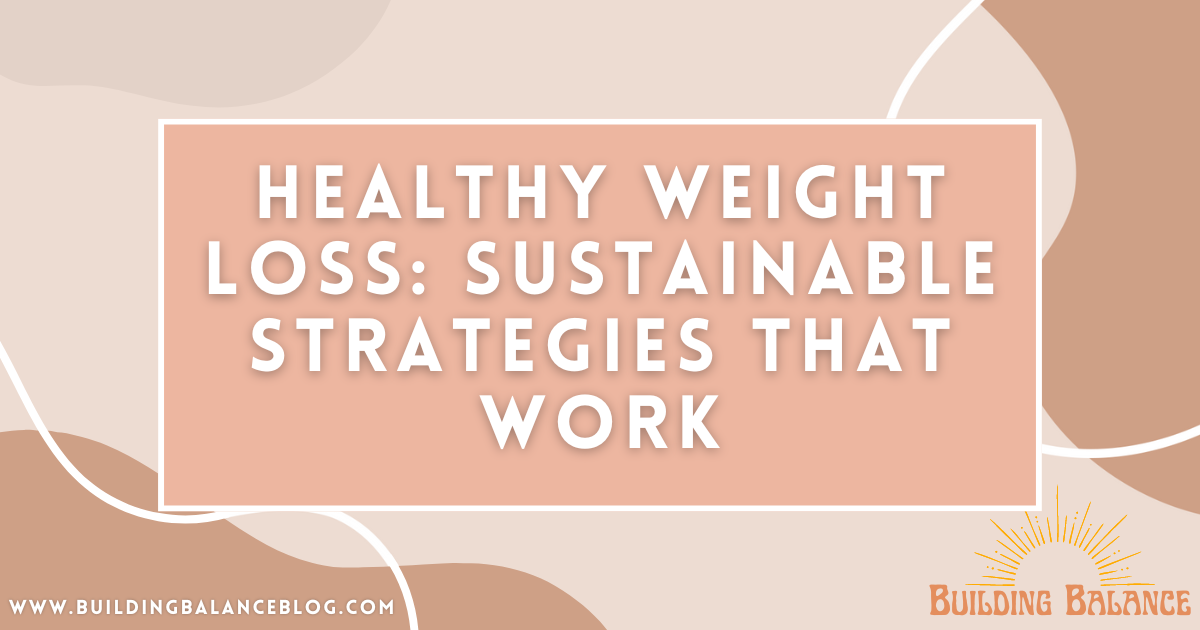
Losing weight can be a daunting task, but with the right strategies, it can be achieved in a healthy and sustainable way. Rather than quick fixes or fad diets, focusing on long-term habits can lead to lasting results and a healthier lifestyle. In this blog post, we will explore various effective strategies for sustainable weight loss.
Understanding Weight Loss
At its core, weight loss occurs when you burn more calories than you consume. This can be achieved through a combination of dietary changes, increased physical activity, and behavioral adjustments. However, the quality of your diet and the type of physical activity you engage in can significantly impact your success and overall health.
1. Set Realistic Goals
Setting realistic and achievable goals is crucial for sustainable weight loss. Aim for a slow and steady weight loss of about 1-2 pounds per week. This may not seem like much, but it adds up to a significant amount over time and is more likely to be maintained in the long run. Unrealistic goals can lead to frustration and the temptation to give up.
2. Focus on Nutrient-Dense Foods
A healthy diet should prioritize nutrient-dense foods that provide essential vitamins, minerals, and other nutrients without excessive calories. Incorporate the following into your diet:
– Fruits and Vegetables: Rich in vitamins, minerals, and fiber while being low in calories. Aim for a variety of colors and types to ensure a broad range of nutrients.
– Whole Grains: Choose whole grains over refined grains. They contain more fiber and nutrients, which help keep you full longer.
– Lean Proteins: Include sources like poultry, fish, beans, lentils, and tofu. Protein helps with muscle maintenance and keeps you satiated.
– Healthy Fats: Opt for sources of unsaturated fats such as avocados, nuts, seeds, and olive oil. These fats are essential for overall health and can help control hunger.
3. Practice Portion Control
Even healthy foods can contribute to weight gain if eaten in large quantities. Understanding portion sizes and practicing portion control can help you consume the right amount of calories. Here are some tips:
– Use Smaller Plates: This can help trick your brain into thinking you are eating more than you actually are.
– Read Food Labels: Pay attention to serving sizes and nutritional information.
– Listen to Your Body: Eat when you are hungry and stop when you are full. Avoid eating out of boredom or stress.
4. Stay Hydrated
Sometimes, thirst can be mistaken for hunger. Drinking water throughout the day can help you stay hydrated and may prevent overeating. Aim for at least 8 cups of water per day, more if you are physically active.
5. Increase Physical Activity
Regular physical activity is essential for weight loss and overall health. It helps burn calories, improves cardiovascular health, and boosts mood and energy levels. Here are some ways to incorporate more activity into your daily routine:
– Find Activities You Enjoy: Whether it’s walking, running, swimming, dancing, or playing a sport, choose activities you enjoy to make exercise a fun part of your day.
– Strength Training: Incorporate strength training exercises at least twice a week. Building muscle helps increase your metabolism and burns more calories at rest.
– Stay Active Throughout the Day: Take the stairs instead of the elevator, walk or bike to nearby destinations, and take breaks to move around if you have a sedentary job.
6. Monitor Your Progress
Keeping track of your progress can help you stay motivated and make necessary adjustments. You can monitor your progress in various ways:
– Keep a Food Diary: Write down what you eat and drink each day to identify patterns and areas for improvement.
– Track Physical Activity: Use a fitness tracker or app to log your workouts and daily steps.
– Regular Weigh-Ins: Weigh yourself regularly, but not too frequently. Once a week is usually sufficient. Remember that weight can fluctuate due to various factors, so focus on overall trends rather than daily changes.
7. Get Enough Sleep
Adequate sleep is often overlooked but is crucial for weight loss and overall health. Poor sleep can disrupt hormones that regulate hunger and appetite, leading to increased cravings and overeating. Aim for 7-9 hours of quality sleep per night.
8. Manage Stress
Chronic stress can lead to emotional eating and weight gain. Finding healthy ways to manage stress is important for maintaining a healthy weight. Consider incorporating relaxation techniques such as:
– Meditation and Deep Breathing: These practices can help calm your mind and reduce stress levels.
– Yoga: Combines physical activity with mindfulness and relaxation.
– Hobbies: Engage in activities you enjoy to distract yourself from stress and improve your mood.
9. Seek Support
Having a support system can make a significant difference in your weight loss journey. Share your goals with friends and family, or consider joining a support group. Professional help from a dietitian, nutritionist, or personal trainer can also provide personalized guidance and motivation.
10. Be Patient and Persistent
Sustainable weight loss takes time and effort. It’s important to be patient with yourself and understand that setbacks are a natural part of the process. Celebrate your successes, no matter how small, and keep pushing forward. Consistency is key to achieving and maintaining a healthy weight.
Healthy weight loss is about making long-term lifestyle changes rather than seeking quick fixes. By focusing on nutrient-dense foods, portion control, regular physical activity, and other sustainable strategies, you can achieve your weight loss goals in a healthy and maintainable way. Remember, the journey is just as important as the destination, so take it one step at a time and be kind to yourself along the way.

